
Number 138 November/December 2020
ISSN 1944-7639 (online version)
Contents
CLIR and HBCU Library Alliance to Study Feasibility for Large-Scale Survey of HBCU Libraries
CLIR Board Appoints New Members, Officers
Virtual DLF Forum and Related Events Draw Record Participation
Louisa Kwasigroch Appointed Interim DLF Senior Program Officer
Material Memory Season 2 Explores Cultural Memory and the Climate Crisis
DLF Working Group, NDSA Receive Digital Preservation Awards 2020
Weave Becomes CLIR’s Newest Affiliate
“The Digital Dilemma in the Time of Covid” Recording Available
CLIR Issues is produced in electronic format only. To receive the newsletter, please sign up at https://www.clir.org/pubs/issues/signup. Content is not copyrighted and can be freely distributed.
Follow us on Twitter @CLIRNews, @CLIRHC, @CLIRRaR, @CLIRDLF
Like us on Facebook @CLIRNews
CLIR and HBCU Library Alliance to Study Feasibility for Large-Scale Survey of HBCU Libraries
In November, CLIR and the HBCU Library Alliance received a $75,000 planning grant from The Andrew W. Mellon Foundation for a project titled “Creating Access to HBCU Library Alliance Archives: Needs, Capacity, and Technical Planning.” The project will identify common barriers and shared visions for creating access to historic collections held by libraries at Historically Black Colleges and Universities (HBCUs).
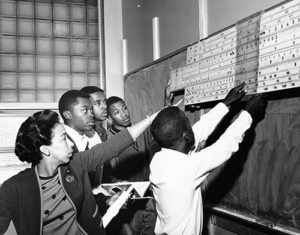
The rare and unique collections in the care of HBCUs, from historic documents to photographic prints and audiovisual media, contain a wealth of information about African American history, culture, and lives. However, many of these materials remain inaccessible. The project will enable the HBCU Library Alliance to envision how its 76 member institutions will work together to preserve, describe, and digitize the unique collections they steward.
“This project is a critical step to enable the discovery of previously ‘hidden’ primary resources at HBCUs that will enrich and broaden the existing body of knowledge about the African American experience,” said HBCU Library Alliance Executive Director Sandra Phoenix. “These archival collections will inform the scholarship produced by students, faculty, and other researchers, strengthening the accuracy and authenticity of the historical accounts about a resilient and accomplished race of people. The HBCU Library Alliance is so pleased to collaborate with CLIR to implement this exciting project.”
Guided by Phoenix and members of the HBCU Library Alliance Board of Directors, the project team will gather input from HBCU library leaders and staff about the ways rare and unique materials in their libraries are currently managed, how they are used, and how they imagine creating access to HBCU collections in the future. CLIR and the HBCU Library Alliance are currently seeking proposals for a focus group facilitator and an interviewer to work with the project team.
“The funding for this project could not have come at a better time,” writes Monika Rhue, HBCU Library Alliance Board chair. “Our HBCU libraries serve as the keepers of some of the most unique materials which tell the stories of the history of the African American experience in our country. Due to the racial and social unrest of this year, it is even more critical to preserve these collections and find ways to increase access. The content and depth of these collections will create limitless opportunities for us to learn from the events of the past and prepare for a better future.”
“Creating access to the archives of HBCU libraries is both timely and urgent,” noted CLIR President Charles Henry. “Making collections that center Black lives and histories widely available to all will enable us to fill gaps in both personal and public histories. CLIR remains committed to amplifying the voices of people whose stories have not yet been widely heard because of a lack of sufficient access, and we stand to learn valuable lessons from the HBCU library leaders and staff who will manage and contribute to this planning effort.”
CLIR Board Appoints New Members, Officers
At its fall meeting, the CLIR Board elected new members Asma Naeem, chief curator at the Baltimore Museum of Art; Ben Vinson III, provost and executive vice president at Case Western Reserve University; and Sandra Phoenix, executive director of the HBCU Library Alliance.
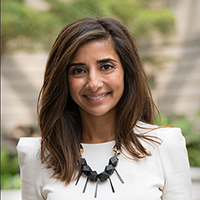
Asma Naeem joined the Baltimore Museum of Art in 2018 from the National Portrait Gallery, where she had been a curator of prints, drawings, and photographs. Naeem specializes in American and contemporary Islamic art, and is particularly interested in the effects of displacement and dispossession, the history of technology, and the sensorial imagination of both artist and beholder. Her 2019 book, Out of Earshot: Sound and Technology in American Art, 1847–1897 (University of California Press), urges scholars to think in new and more expansive ways about relations among the visual arts, sound technologies, and the senses of sight and sound.
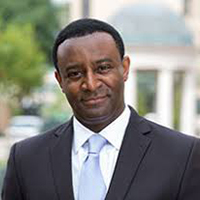 Ben Vinson III is responsible for all facets of the academic programs and research at Case Western Reserve University. He spearheaded the university’s Think Big strategic planning initiative, and has worked to increase collaboration and entrepreneurship on campus by naming an associate provost to the post of interprofessional education, research and collaborative practice; and by appointing a founding director for the Veale Institute for Entrepreneurship. He is a historian of Latin America, and the recipient of the 2019 Howard F. Cline Book Prize in Mexican History for his book, Before Mestizaje: The Frontiers of Race and Caste in Colonial Mexico. He is chairman of the board of the National Humanities Center and member of the board of the National Humanities Alliance.
Ben Vinson III is responsible for all facets of the academic programs and research at Case Western Reserve University. He spearheaded the university’s Think Big strategic planning initiative, and has worked to increase collaboration and entrepreneurship on campus by naming an associate provost to the post of interprofessional education, research and collaborative practice; and by appointing a founding director for the Veale Institute for Entrepreneurship. He is a historian of Latin America, and the recipient of the 2019 Howard F. Cline Book Prize in Mexican History for his book, Before Mestizaje: The Frontiers of Race and Caste in Colonial Mexico. He is chairman of the board of the National Humanities Center and member of the board of the National Humanities Alliance.
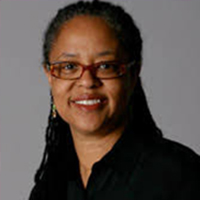 Sandra Phoenix has more than 30 years’ experience at nonprofit organizations and extensive project management experience. Responsible for the overall operations of the HBCU Library Alliance, she provides leadership in developing strategic and financial planning; managing an organizational budget with the Board of Directors; managing, publicizing, and promoting grant-related activities of the organization; and promoting active participation on grant projects by member institutions.
Sandra Phoenix has more than 30 years’ experience at nonprofit organizations and extensive project management experience. Responsible for the overall operations of the HBCU Library Alliance, she provides leadership in developing strategic and financial planning; managing an organizational budget with the Board of Directors; managing, publicizing, and promoting grant-related activities of the organization; and promoting active participation on grant projects by member institutions.
“CLIR is privileged to welcome our distinguished new Board members,” said CLIR president Charles Henry. “At a particularly challenging time, they bring exceptional leadership in the professional fields of libraries, museums, and higher education administration that will help guide us and strengthen our mission to these important constituencies.”
The Board also voted new officers for two-year terms. Buhle Mbambo-Thata, director of resource development for AfLIA-African Library and Information Associations and Institutions, will serve as chair. Guy Berthiaume, librarian and archivist of Canada emeritus, will serve as vice chair. John Wilkin, dean of libraries and university librarian at University of Illinois at Urbana-Champaign, will serve as treasurer.
Virtual DLF Forum and Related Events Draw Record Participation
While the pandemic compelled this fall’s DLF Forum and affiliated events to be held virtually, there was a silver lining. Participation tripled, with nearly 2,200 registrants representing all 50 states and 36 countries—by far the broadest geographical representation to date.
Stacey Patton, journalist and professor at Howard University and Morgan State University, opened the Forum November 9 with a riveting keynote, “Do Black Lives Matter in Galleries, Libraries, Archives, and Museums?” This was followed by two days of panels, tutorials, and lightning talks covering a range of topics, from creating accessible and inclusive content to using GIS tools for engagement and outreach at an HBCU library. Recordings and transcripts for all Forum sessions can be found here.
New this year was the presence of 11 community journalists—attendees from various backgrounds who were given stipends to share their voices and experiences on the DLF blog. Hsiu-Ann Tom writes, “Dr. Stacey Patton’s words during her opening address stayed with me throughout the conference as I considered the topic of accessibility in my daily work. She asked attendees to consider our role as archivists. As a new archivist trying to develop policies, procedures and workflows that encourage access and use for those coming to my archive, how can I perform my work more inclusively? Are there communities being overlooked? What needs are going unmet and how do I address them? Current discussions and work around accessibility are critical to ensuring that all patrons have access to the work we perform.” Ana Hilda Figueroa de Jesús notes, “The 2020 Virtual DLF Forum included more than spaces for education. It was about feedback, mutual aid, being open to new perspectives, and building a community.” Read their reflections here.
Jennifer Ferretti, artist and digital initiatives librarian at the Maryland Institute College of Art on Piscataway Land in Baltimore, MD, kicked off NDSA Digital Preservation 2020: Get Active with Digital Preservation November 12 with her thought-provoking keynote, “What’s Behind the Curtain: The Performance of Digital Stewardship and the Need for Real Leadership.” The day continued with the presentation of NDSA innovation awards, panels, combo sessions, a “get active with NDSA” brunch, and lightning talks before wrapping up with a closing plenary. Recordings and transcripts for the day’s sessions are available here.
5 for 5: Conversations on Five Years of Digitizing Hidden Collections celebrated the fifth year of CLIR’s Digitizing Hidden Collections program and featured speakers from more than 20 projects in five sessions on November 13.
Shared notes are available for all the events.
While this year’s Forum and affiliated events were free, participants were invited to donate to DLF and its Child Care Fund, as well as to the Baltimore-based Youth Empowered Society and to the Baltimore Restaurant Relief Fund. In all, nearly $6,500 was donated.
Forum sponsors this year included Aviary, AVP, Digital Bedrock, Discovery Garden, Material Memory, Picturae, Preservica, and Quartex.
Louisa Kwasigroch Appointed Interim DLF Senior Program Officer
In November, Louisa Kwasigroch was named interim Digital Library Federation (DLF) senior program officer. Kwasigroch, who is currently CLIR’s director of outreach and engagement and has worked extensively with the DLF community, will  serve as the primary point of contact for DLF member institutions and individuals until a permanent senior program officer is appointed. During the interim period, she will also continue to serve as director of outreach and engagement.
serve as the primary point of contact for DLF member institutions and individuals until a permanent senior program officer is appointed. During the interim period, she will also continue to serve as director of outreach and engagement.
“I’m delighted Louisa has accepted this interim appointment,” said CLIR president Charles Henry. “With her knowledge of DLF’s engaged and active community, she will bring an empathetic and insightful continuity that will position us strategically for the next phase of DLF’s evolution.”
Kwasigroch has been in the library field for more than 15 years, working with public, museum, and academic libraries. She has her BA in photography from Columbia College Chicago, and both an MSLIS and MBA from the University of Illinois, Urbana-Champaign. She began her career with CLIR in 2013 as a DLF program associate and was promoted to director of development and outreach in 2015 and director of outreach and engagement in 2020.
“It has been a great joy to serve the DLF community these past seven years in my roles at CLIR,” said Kwasigroch. “I look forward to continuing to support our members, working groups, and constituents while collaborating even more closely with CLIR and DLF staff, who have been doing an amazing job moving things forward.”
CLIR will resume its search for a permanent senior program officer in January 2021.
Material Memory Season 2 Explores Cultural Memory and the Climate Crisis
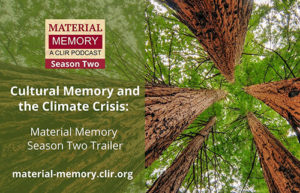
The first episodes of CLIR’s podcast, Material Memory, season two, are now available. Season two explores the impact of the climate crisis on communities and their cultural heritage. Episode 1, “Does it Matter? Cultural Memory and the Climate Crisis,” features commentary from the season’s seven guests about the risks climate change poses to our cultural memory and why we should care. In episode 2, “Archivists Against the Climate Crisis,” host Nicole Kang Ferraiolo speaks with archivists Eira Tansey and Ben Goldman about their approaches to climate activism and the superpowers librarians can bring to the fight for environmental justice.
The forthcoming episode 3 will feature an interview with emergency management specialist, anthropologist, and Africana studies scholar Crystal Felima about emergency preparedness and how we tell the story of disaster.
Subscribe to Material Memory wherever you get your podcasts, or listen through the website. Submit a review of our podcast on Apple Podcasts, Stitcher, Podchaser, or Castbox between now and January 31, 2021, and CLIR will have a tree planted in your honor. Listeners may also enter their review into a contest and be eligible to win a $100 cash card (contest entries due by December 31, 2020). Learn more.
DLF Working Group, NDSA Receive Digital Preservation Awards 2020
DLF’s Born Digital Working Group and NDSA were among seven winners of the Digital Preservation Coalition’s annual Digital Preservation Awards, announced in early November in conjunction with World Digital Preservation Day.
DLF’s Born Digital Access Working Group‘s document, Levels of Born Digital Access received the Software Sustainability Institute (SSI) Award for Research and Innovation. The document provides a tiered set of format-agnostic practices to facilitate and improve access to born-digital materials across five distinct areas: accessibility, description, researcher support and discovery, security, and tools. In addition to defining a set of recommended baseline access requirements, the document also lays out concrete and actionable recommendations that institutions can implement according to their needs, resources, and abilities. Developed using an interactive and collaborative approach, the guidelines are responsive to practitioners’ and researchers’ needs, while also serving as a potentially inclusive model for future standards development.
NDSA‘s Levels of Digital Preservation Revision project received the International Council on Archives Award for Collaboration and Cooperation. Updated from its first release in 2013, Levels of Digital Preservation revision represents a codification of current technological practices for long-term preservation of digital resources in galleries, libraries, archives, and museums. These guidelines are presented in an easy to understand matrix designed to be useful for newcomers and experts alike. The redesign looks at five functional areas of digital preservation and recommends a tiered set of practices that map to four increasingly robust levels of digital preservation. Available in multiple languages, this update also includes an assessment tool and technological implementation guidance for using the levels.
Hearty congratulations to all who contributed to these significant projects.
Weave Becomes CLIR’s Newest Affiliate
Weave: Journal of Library User Experience has become CLIR’s newest affiliate organization. Launched in 2014, Weave is an open-access, peer-reviewed journal for library user experience professionals published by Michigan Publishing. According to the terms of a memorandum of understanding signed in November, CLIR will serve as fiscal host for the publication.
CLIR started its affiliate program in 2014 to help organizations with missions similar to CLIR’s, but which are not independent legal entities and need a fiscal or administrative home. Affiliates retain their own governance and mission; CLIR provides financial and administrative services and access to tools, platforms, research, and expertise to allow affiliates to better serve their constituencies.
The Digital Dilemma in the Time of COVID
A recording of the December 8 discussion, “The Digital Dilemma in the Time of COVID” is now available. Organized by the Center for Advanced Study in the Behavioral Sciences (CASBS) at Stanford University and cosponsored by CLIR, in partnership with Bloomberg Beta and the Human Screenome Project, the webcast was part of the CASBS series, “Social Science for a World in Crisis.”
Nilam Ram, Byron Reeves, Abby Smith Rumsey, and Maryanne Wolf join in conversation with John Markoff to explore the profound implications of digital technologies for influencing the intellectual, social, emotional, and ethical development of younger generations and, potentially, the cerebral evolution of our species.

